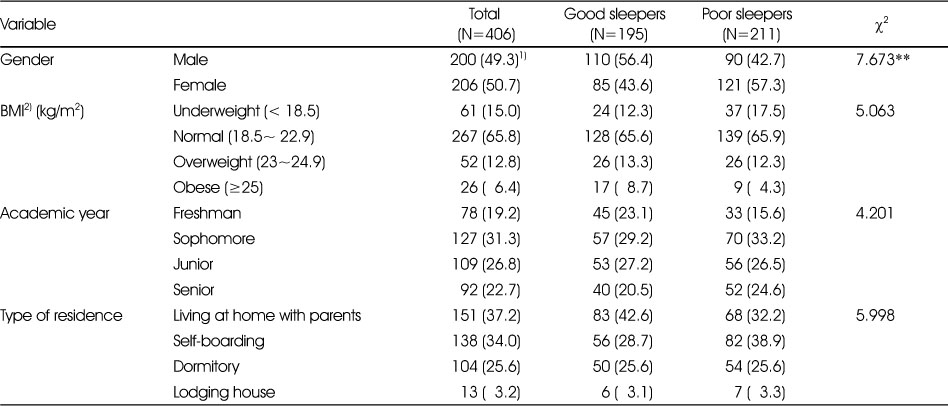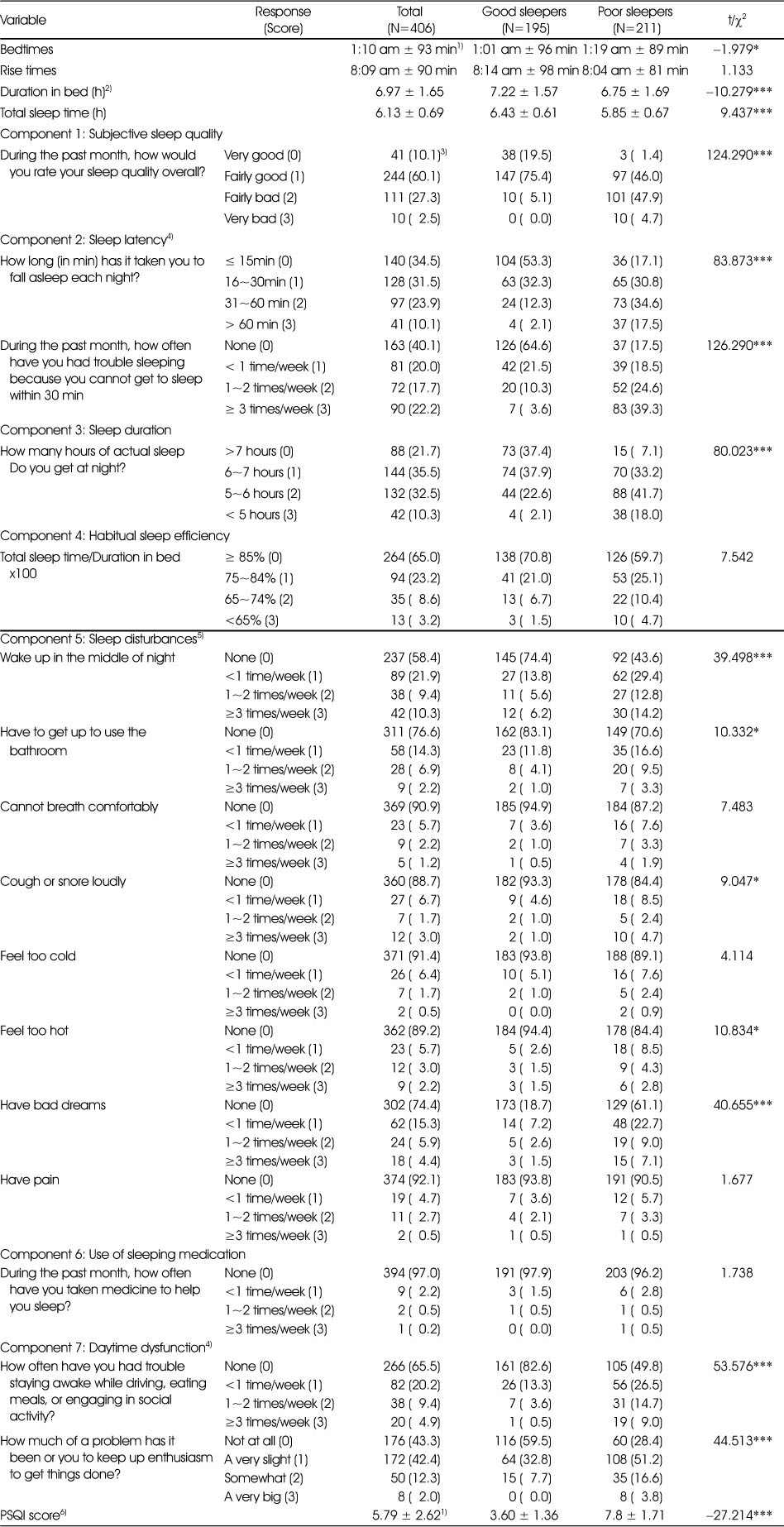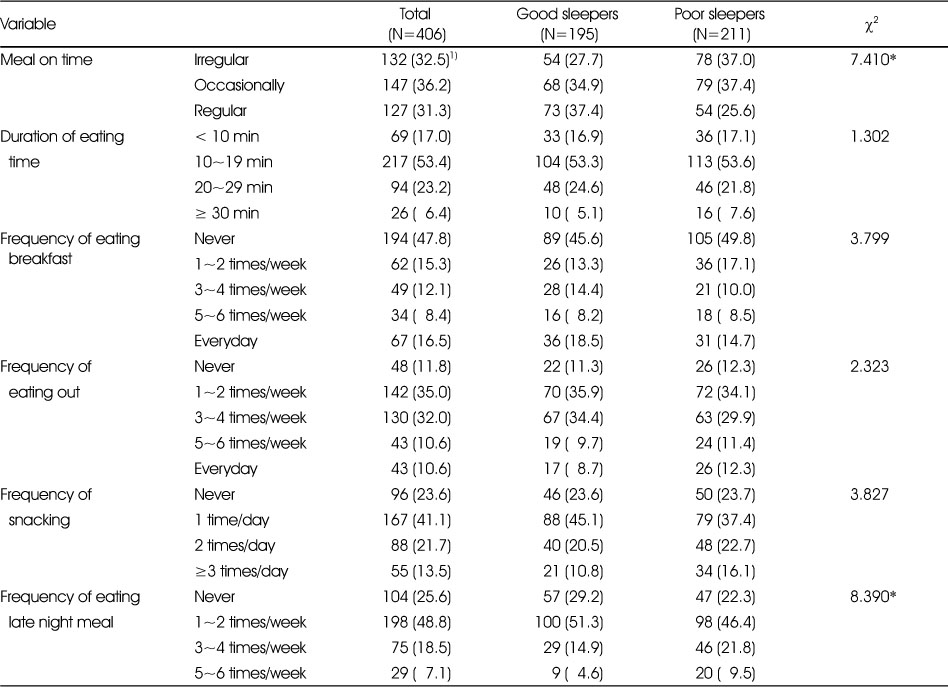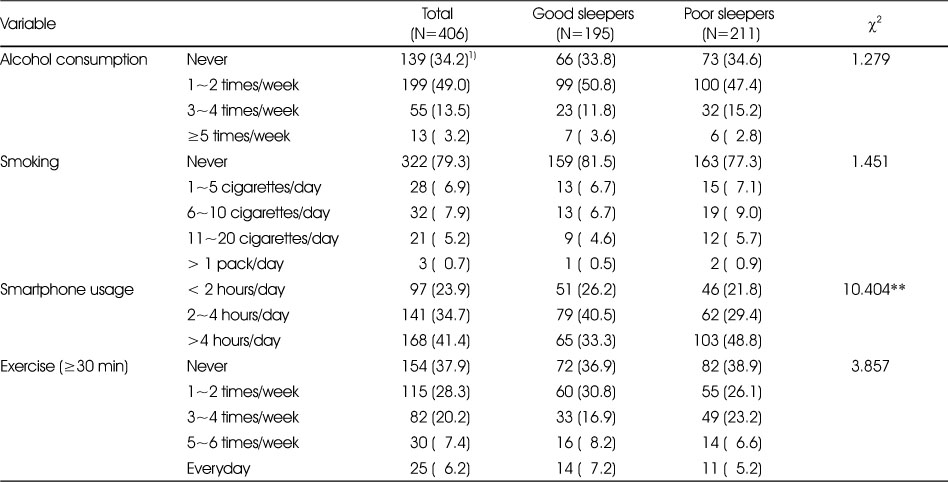References
1. Kim SH, Min JW, Park BK. The effect of smartphone addiction and stress on sleep quality among university students. J Korea Acad Ind Coop Soc 2019;20(4):112–120.
2. Jang SY, Ju EY, Park KM, Seo S, Choi SJ, Lee CK. Association between sleep duration and obesity in young Korean adults. Korean J Obes 2016;25(4):207–214.
3. Buysse DJ, Reynolds CF, Monk TH, Berman SR, Kupfer DJ. The Pittsburgh Sleep Quality Index: A new instrument for psychiatric practice and research. Psychiatry Res 1989;28(2):193–213.
4. Mollayeva T, Thurairajah P, Burton K, Mollayeva S, Shapiro CM, Colantonio A. The Pittsburgh Sleep Quality Index as a screening tool for sleep dysfunction in clinical and non-clinical samples: a systematic review and meta-analysis. Sleep Med Rev 2016;25:52–73.
5. Kim HB, Park YW. Correlation between sleep quality and snack intake in third year middle and high school students in the Gwangju area. J Korean Soc Food Sci Nutr 2013;42(2):212–222.
6. Ro HL. Analysis of the relationship among sleep type and sleep quality, and perceived life stress in college students: Based on students living in a dormitory. J Korean Data Anal Soc 2017;19(2):1011–1024.
7. Park MJ, Chung MY. Quality of sleep and affecting factors according to gender in college students. J Digit Converg 2018;16(9):187–195.
8. Lee BI, Kim KM, Kim BM, Kim BM, Kim JE, Lee IH. Caffeine contained beverage intake and sleep quality of university students. J Korean Soc Sch Health 2014;27(1):31–38.
9. Sung MJ, Chang KJ. Correlations among life stress, sleep, anthropometric measurement and nutrient intakes of college students. J Korean Soc Food Sci Nutr 2007;36(7):840–848.
10. Kim SD, Kim MG. The relation of life style and quality of sleep in university students. J Korea Acad Ind Coop Soc 2013;14(6):2795–2801.
11. Kang SG, Yoon HK, Ham BJ, Choi YK, Kim SH, Joe SH. Effects of minor stressful events on sleep in college students. Sleep Med Psychophysiol 2002;9(1):48–55.
12. Yi H. Sleep quality and its associated factors in adults. J Korean Public Health Nurs 2013;27(1):76–88.
13. Kang YH, Kim MY, Lee GJ, Jung DY, Ma YW. A study of social support, loneliness, sleep quality, and perceived health status among community dwelling older adults. J Korean Public Health Nurs 2012;26(2):303–313.
14. Kim KH, Cho HS. Effect of sleep duration on dietary habits and body composition of university students. Korean J Food Cult 2013;28(5):539–546.
15. Spiegel K, Tasali E, Penev P, Van Cauter E. Brief communication: Sleep curtailment in healthy young men is associated with decreased leptin levels, elevated ghrelin levels, and increased hunger and appetite. Ann Intern Med 2004;141(11):846–850.
16. Kim CR, Song YM, Shin JY, Gim W. Association between sleep duration and impaired fasting glucose in Korean adults: results from the Korean National Health and Nutrition Examination Survey 2011-2012. Korean J Fam Med 2016;37(1):51–56.
17. Hwang HR, Lee JG, Lee SY, Cha KS, Choi JH, Jeong DW. The relationship between hypertension and sleep duration: an analysis of the fifth Korea National Health and Nutrition Examination Survey (KNHANES V-3). Clin Hypertens 2015;21(1):8.
18. Lee SL, Lee SH. Survey on health-related factors, nutrition knowledge and food habits of college students in Wonju area. Korean J Community Nutr 2015;20(2):96–108.
19. Pae MK. Dietary habits and perception toward food additives according to the frequency of consumption of convenience food at convenience stores among university students in Cheongju. Korean J Community Nutr 2016;21(2):140–151.
20. Kim MH, Kim H, Lee WK, Kim SJ, Yeon JY. Food habits and dietary behavior related to using processed food among male college students residing in dormitory and self-boarding in Gangwon. Korean J Community Nutr 2013;18(4):372–385.
21. Smith SL, Ludy M, Tucker RM. Changes in taste preference and steps taken after sleep curtailment. Physiol Behav 2016;163:228–233.
22. Patterson RE, Emond JA, Natarajan L, Wesseling-Perry K, Kolonel LN, Jardack P. Short sleep duration is associated with higher energy intake and expenditure among African-American and Non-Hispanic white adults. J Nutr 2014;144(4):461–466.
23. Kim S, DeRoo LA, Sandler DP. Eating patterns and nutritional characteristics associated with sleep duration. Public Health Nutr 2011;14(5):889–895.
24. Kim SJ, Lyoo IK, Won CY, Jeong DU. Characteristics of sleep pattern among Korean college students. Sleep Med Psycophysiol 2006;13(1):15–21.
25. Sohn SI, Kim DH, Lee MY, Cho YW. The reliability and validity of the Korean version of the Pittsburgh Sleep Quality Index. Sleep Breath 2012;16(3):803–812.
26. Korean Society for the Study of Obesity. Guideline for treatment of obesity Seoul: Korean Society for the Study of Obesity; 2012. p. 17–21.
27. Kim SD, Kim MG. The relation of life style and quality of sleep in university students. J Korea Acad Ind Coop Soc 2013;14(6):2795–2801.
28. Seo JS, Lee JH, Lee KK. Lifestyle and health state in individuals with frequent nocturnal sleep interruption. J Korean Acad Fam Med 2006;27(12):967–974.
29. Kim MH, Jeong ES, Kim EJ, Cho HK, Bae YJ, Choi MK. Night eating status of university students in partial area of Chungnam. J East Asian Soc Dietary Life 2011;21(4):563–576.
30. Baron KG, Reid KJ, Kern AS, Zee PC. Role of sleep timing in caloric intake and BMI. Obesity 2011;19(7):1374–1381.
31. Hong JH, Kim SY. Correlation between eating behavior and stress level in high school students. J Korean Soc Food Sci Nutr 2014;43(3):459–470.
32. Kim MH, Kim H, Lee WK, Kim SJ, Yeon JY. Food habits and dietary behavior related to using processed food among male college students residing in dormitory and self-boarding in Gangwon. Korean J Community Nutr 2013;18(4):372–385.
33. Kim TY, Kim SM, Kim JY, Im JY, Yu H, Han YH. Awareness and consumption of energy drinks and associated factors among college students in Cheongju. Korean J Community Nutr 2018;23(1):60–72.
34. Lv W, Finlayson G, Dando R. Sleep, food cravings and taste. Appetite 2018;125:210–216.
35. Szczygiel EJ, Cho S, Snyder MK, Tucker RM. Associations between chemosensory function, sweet taste preference, and the previous night's sleep in non-obese males. Food Qual Preference 2019;75:105–112.
36. Lee KA. Salt-related dietary behaviors of university students in Gyeongbuk area. J Korean Soc Food Sci Nutr 2014;43(7):1122–1131.
37. Kang MJ, Choi KB, Lyu ES. Differences in sodium-intake related dietary behaviors and correlation analysis according to salty taste preference of university students in Busan area. Korean J Food Cook Sci 2015;31(4):477–484.
38. Lee BI, Kim SW, Kim YJ, Bae JY, Woo SK, Woo HN. The relationship between smartphone usage time and physical and mental health of university students. J Korean Soc Sch Health 2013;26(1):45–53.
39. Jung MS, Ju KO, Song MS, Lee KS. Effects of smartphone overuse on perceived cognitive function, fatigue, and daytime sleepiness among college students. J Korean Soc Sch Health 2016;29(3):245–255.
40. Park SY. The correlations between a sleep quality and a healthrelated quality of life according to a adult smart phone use time. J Next Gener Converg Tech Assoc 2018;2(4):181–188.
41. Kim SH, Min JW, Park BK. The effect of smartphone addiction and stress on sleep quality among university students. J Korea Acad Ind Coop Soc 2019;20(4):112–120.
42. Van den. Adolescent use of mobile phones for calling and for sending text messages after lights out: results from a prospective cohort study with a one-year follow-up. Sleep 2007;30(9):1220–1223.
43. Crum RM, Storr CL, Chan YF, Ford DE. Sleep disturbance and risk for alcohol-related problems. Am J Psychiatry 2004;161(7):1197–1203.
44. Roehrs T, Roth T. Sleep, sleepiness, sleep disorders and alcohol use and abuse. Sleep Med Rev 2001;5(4):287–297.
45. Cho SB, Lee SH. Sleep disorder and alcohol. Sleep Med Psychophysiol 2017;24(1):5–11.
46. Kim MG, Kim SD. The effect of smoking behavior on sleep quality in university students. J Korea Acad Ind Coop Soc 2018;19(3):346–352.








